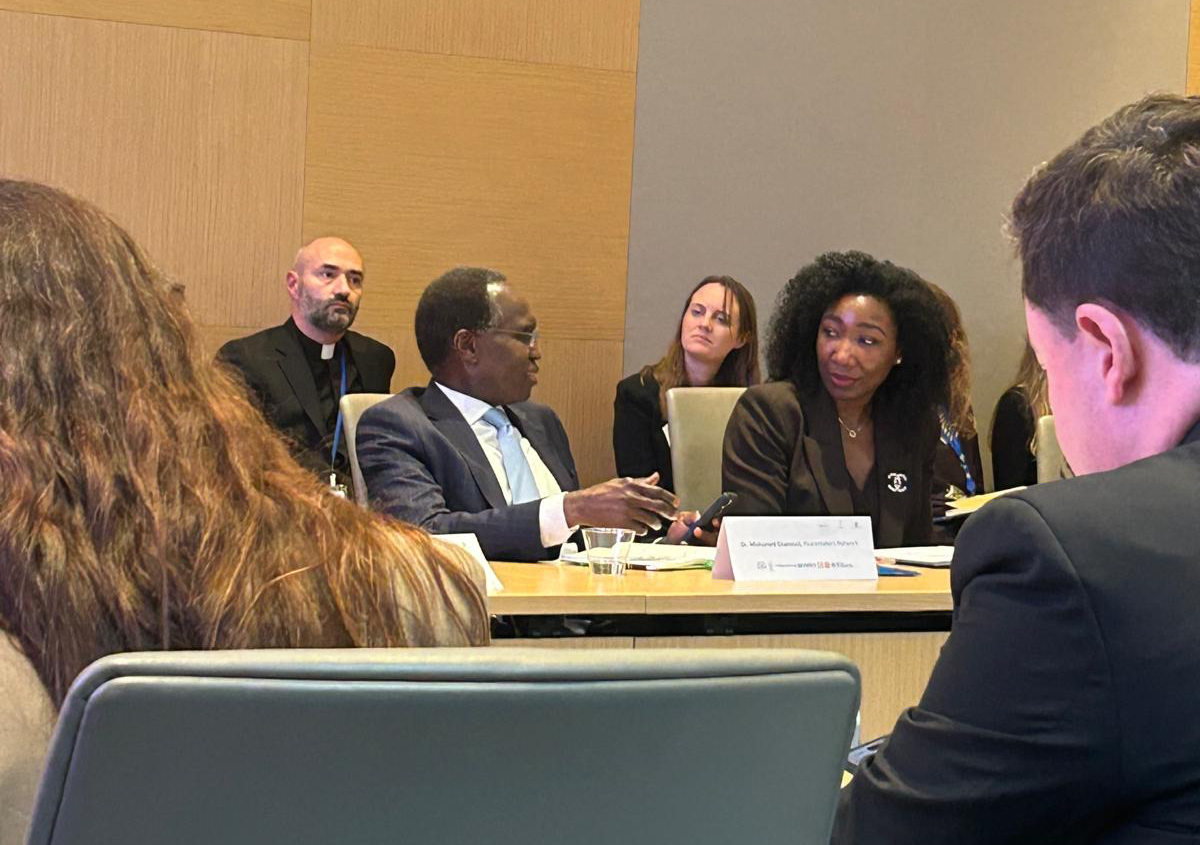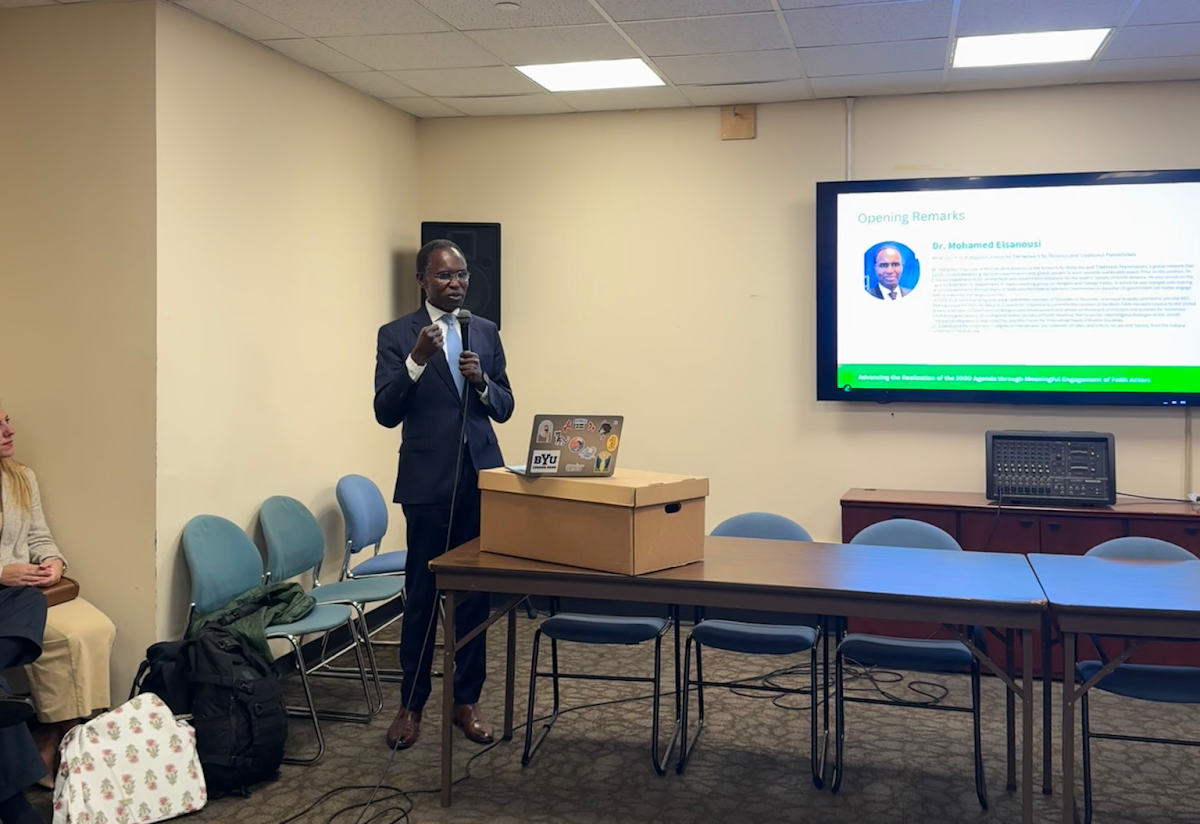Faith at UNGA: UN Multi-Faith Advisory Council and Reimagining Interreligious Cooperation
September 2025
Side Event: Keeping Faith in Dialogue:
Reimagining Interreligious Cooperation for a New Agenda for Peace
As global tensions rise and communities face unprecedented challenges, a diverse coalition of faith leaders, UN representatives, and civil society actors gathered on the margins of the 80th United Nations General Assembly to explore how inclusive interreligious engagement is critical to achieving sustainable peace.
Hosted by the Multi-Faith Advisory Council (MFAC) to the UN Inter-Agency Task Force (IATF) on Religion and Sustainable Development and the International Dialogue Centre (KAICIID), in cooperation with the United Nations Alliance of Civilizations (UNAOC), Religions for Peace, the United Nations Population Fund (UNFPA), and the Office of the United Nations Special Adviser on the Prevention of Genocide (OSAPG), hosted a high-level event on the margins of the 80th United Nations General Assembly (UNGA80), hosted the event, ‘Keeping Faith in Dialogue: Reimagining Interreligious Cooperation for a New Agenda for Peace,’ focused on the role of interreligious and multistakeholder alliances in advancing global stability and resilience.
The event brought together diverse stakeholders, faith leaders, government representatives, international organizations, civil society, and youth to examine how cross-sector collaboration can address the root causes of conflict, promote social cohesion, and contribute to long-term peace.

Dr. Mohamed Elsanousi speaks about inclusive peacebuilding on the panel with Dr. Nkeiruka Didigu.
Peacemakers Network Executive Director, Dr. Mohamed Elsanousi joined a high-level panel moderated by Dr. Nkeiruka Didigu, UN-IATF Co-Chair, Senior Strategic Partnerships Specialist, and Faith, Religion and Culture Lead for the UNFPA.
Dr. Elsanousi highlighted the Peacemakers Network’s work to advance the meaningful participation of women and youth in peacebuilding and affirming the critical role of religious and interreligious communities in achieving just and lasting peace.
“Strategies like the New Agenda for Peace are visionary, flexible, inclusive, and grounded in the real-world experience of those on the front lines of conflict and transformation.” –Dr. Mohamed Elsanousi
He was joined by esteemed panelists: Ms. Bani Dugal, Principal Representative of the Bahá’í International Community to the UN and Co-President of Religions for Peace; Fr. Stephen Ojapah, KAICIID Fellow and Catholic Priest for the Missionary Society of Saint Paul of Nigeria; and Dr. Liliya Khasanova, Executive Director for A Common Word Among Youth (ACWAY). Each panelist spoke to their personal experiences in faith and peacebuilding; Dugal emphasized Bahá’í values of unity and compassion, Dr. Khasanova advocated for youth and grassroots leadership, and Fr. Ojapah shared a moving personal story about the power of forgiveness even in the most trying times, illustrated further in his powerful memoir Tears and Torture: 33 Days in Kidnappers’ Den.
High-Level Multi-Faith Reception
Following the event, MFAC hosted a high-level multi-faith reception to engage in dialogue on faith commitments in commemoration of the 80th session of the United Nations General Assembly under the theme ‘Better together: 80 years and more for peace, development and human rights.’
The evening consisted of a series of short remarks from MFAC and IATF Co-Chairs, followed by space for meaningful conversations to celebrate faith actors’ committed engagement and solidarity with the UN and their work to promote human rights and solutions for a better, fairer, and more peaceful world.

Dr. Mohamed Elsanousi delivers welcoming remarks during the high-level reception.
“We are grateful for the progress made in bringing faith-based institutions to the multilateral table. Together, we move closer to realizing the promise of Agenda 2030 and beyond.” –Dr. Mohamed Elsanousi
Numerous MFAC and IATF members were present, including Religions for Peace, Finnish Evangelical Lutheran Mission (FELM), Lutheran World Federation (LWF), World Council of Churches (WCC), The International Partnership on Religion and Sustainable Development (PaRD), Tanenbaum, World Vision International, World Faiths Development Dialogue, and Islamic Relief Worldwide.
Follow the Peacemakers Network on social
